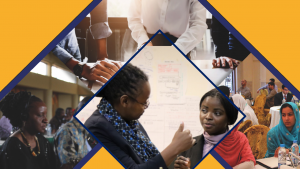Improving the use of knowledge in policy in Peru
The Secretariat for Public Administration of the Prime Minister’s Office in Peru and the Economic and Social Research Consortium will work to improve the use of knowledge in policy with support from INASP and Politics & Ideas
A joint proposal from two organizations in Peru has been selected to improve the use of knowledge in policy through the application of the ‘Context Matters’ framework, developed by Politics & Ideas and INASP. This framework can be used as a diagnostic tool to help agencies understand the current state of knowledge production and use to inform policy, identify windows of opportunity for change, prioritize areas for improvement and co-design feasible change plans.
In a call announced in June, INASP and Politics & Ideas invited proposals from committed change makers that are eager to initiate a process of change in their organizations or support a process that has already started. The exercise will produce a comprehensive diagnosis of the organizations, select top areas that have room for improvement, and develop a change plan.
According to Clara Richards, Senior Programme Manager for Evidence-Informed Policy Making at INASP, the call was very successful, attracting a total of 22 applications from Latin America, Africa and Central Europe. Most of the applications were from individual agencies from line ministries but some were joint proposals from research centres and government agencies.
“This demonstrates the level of interest and need for this type of work from government agencies. Since the applications were of very good quality, INASP and Politics & Ideas will speak with all the applicants over coming months to explore potential ways to collaborate,” she said.
The winning proposal was from the Secretariat for Public Administration (SGP) of the Prime Minister’s Office in Peru, which is in charge of proposing, articulating, implementing and evaluating the National Policy for Public Management Modernization. SGP jointly applied with the Economic and Social Research Consortium (CIES), a consortium of academic institutions and think tanks from Peru with a mission to produce and disseminate relevant research to impact public policy decisions.
The government of Peru has recently reinforced the importance of increasing citizen-experience in all policy making, public services and regulation towards all public entities. The partners believe that this creates a window of opportunity to frame their work and discussions using the systematic approach proposed by INASP and Politics & Ideas.
In their response to the Politics & Ideas/INASP call, SGP and CIES set out their case that participation in this project would enable not only revision and improvement of SGP’s role as a central department with relationships with multiple levels of government but it would also improve direct user feedback to the knowledge producer. “It would allow to answer two basic questions: (a) is what CIES producing helpful for the policymaker? (b) How can we improve the relevance of the knowledge, in terms of content and delivery mechanism? The diagnosis document and tailored change plan will help CIES implement a better dissemination strategy in the future. Furthermore, it will allow us to move forward with SGP’s request for a systematized policy research online hub,” said the partners.
Vanesa Weyrauch of Politics & Ideas, noted that the two partners in Peru represent a strong and diverse team with a long trajectory in government and academy and great potential to impact different policy areas.
“SGP deals with various policy topics so the reach involves several ministries and secretaries. The same applies to CIES since it develops inter-ministerial dialogues and studies performed by various think tanks and universities that are relevant for the entire public agenda,” she explained. “We are excited about working with these two partners to help them better understand their organizational context and jointly develop a solid and viable plan to strengthen the current use of knowledge in policy.”
Notes for editors
About The Secretariat for Public Administration of the Prime Minister’s Office
The Secretariat for Public Administration of the Prime Minister’s Office [SGP at PCM] is in charge of proposing, articulating, implementing and evaluating the National Policy for Public Management Modernization. As part of this effort, SGP deals with various policy topics such as public sector ethics, open government, knowledge management, process management and the optimal structure of the public administration. It also leads the efforts in regulatory simplification and improvement of citizen services at the national level. In addition, SGP leads the Governance Committee of Peru’s OECD ascension task force. The team reviews policy knowledge from various sources, national and international, on a constant basis to incorporate new ideas into their policy proposals.
About The Economic and Social Research Consortium
The Economic and Social Research Consortium [CIES] is a decentralized consortium of 48 academic institutions and think tanks from Peru. CIES’ mission is to produce and disseminate relevant research to impact public policy decisions. CIES has produced over 500 academic documents regarding public policy in the last 20 years. It has also organized the debates of the technical teams and candidates in the last two presidential elections (2011 & 2016), as well as the last regional gubernatorial races (2014). CIES is currently conducting and independent evaluation of the impact of this work on policy decisions.
About Politics & Ideas
Politics & Ideas: a think net is a Southern-led space and joint initiative of researchers and practitioners to co- produce and share innovative and relevant knowledge linking ideas and politics in developing and emerging economies.
About INASP
INASP is an international development organization working with a global network of partners in Africa, Latin America and Asia. In line with the vision of research and knowledge at the heart of development, INASP works to support individuals and institutions to produce, share and use research and knowledge, which can transform lives. INASP promotes equity by actively addressing the needs of both men and women across all our work and addressing issues of power within the research and knowledge system.




